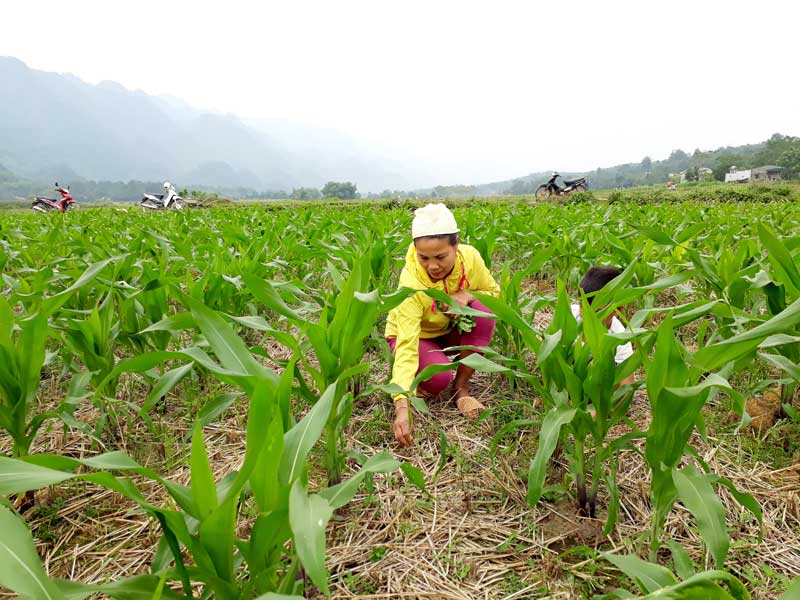
(HBO) – Despite the devastating impacts of the recent floods, farmers in Phu Luong commune, Lac Son district, the northern mountainous province of Hoa Binh, have maintained agricultural production. Over the past nearly ten years, after harvesting the summer-autumn crop, locals continued with the winter crop.
Local farmers are working hard in corn fields. Such vast, green corn fields have erased the image of fields previously destroyed by downpours and floods in many localities of Hoa Binh.
"Over the past ten years, the summer-autumn crop has been followed by the winter crop, mainly corn cultivation. Local farmers also plant vegetables and bulbs like onion in winter. However, a number of fields have been let free during this crop due to impacts of the recent floods. Phu Luong now has 125ha of corn, more than 50ha of vegetables and beans, and 1.5ha of onion,” said Bui Van Au, Vice Chairman of the Phu Luong commune People’s Committee.
Bui Thi Tach from Pheo hamlet, Phu Luong commune, Lac Son district, is taking care of her family’s winter corn field
Thanks to a good water drainage system, the corn field of Bui Thi Tach’s family has not been affected by the floods. Knee-high corn plants are growing together with celery cabbage.
"Traditionally, after the summer-autumn crop, fields were let free until spring. However, over the past ten years, local farmers have cultivated the winter crop. Winter corn plants grow even better than in main crops despite initial difficulties. Unseasonal corn is sold at a higher price while providing animal feed,” Tach said.
To facilitate irrigation, local farmers have dug small cannels around fields.
"The cannels aim to discharge water in case of downpours and bring water to corn fields. Winter corn requires more care in winter. Apart from water, winter corn plants need fertilizers,” Tach added.
Next to fields of Pheo hamlet, fields of Mong hamlet are also covered with green corn plants during this winter.
Winter crop production plays an important role to Phu Luong, a remote commune with a lot of difficulties and poverty rate of over 60 percent.
"Residents of Phu Luong commune, which has been included in the Programme 135, have to face various economic difficulties. Therefore, winter crop production has brought about economic values, helping them increase income and ensure livestock feed. In the years to come, we will continue cultivating winter crops while encouraging local farmers to grow higher-value plants in order to raise income,” said Bui Van Au./.
In Lac Thuy district, communes have been succeeded in promoting their One Commune-One Product (OCOP) products while others are still struggling to position their typical farming products in market. Some communes in the district still fail to have their products met OCOP programme’s requirements, while others have seen their certifications expired.
The inspectorate agency of Hoa Binh province has issued Official Dispatch No. 1090/TTr-PCTN to provincial departments, agencies, localities, business associations, enterprises, and investors regarding measures to improve informal component indexes of the Provincial Competitiveness Index (PCI).
Hoa Binh is taking concrete steps to improve its investment environment, with a strong focus on supporting businesses, settling obstacles for strategic investors, and creating opportunities for robust development in the coming years.
Under the blazing early summer sun, the construction site of Nhuan Trach Industrial Park (IP) in Luong Son district is abuzz with activities from dawn to dusk, a testament to the determination of the investor to meet their construction targets on schedule.



